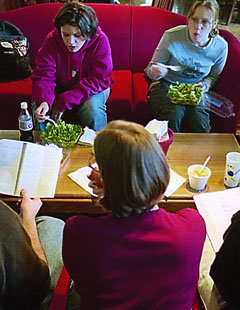The Union Workers
Who served you lunch today? How long have they worked there, when does their shift end, what do they think of you? These are questions most people ignore. The cashier’s job is to ring up your food, never mind what problems she has with her husband or the chronic headaches that no over-the-counter medicine can take away. Those problems are hers, and you just want to pay for your sandwich. Besides, you’re a busy person with issues of your own. You don’t have the time or emotional energy to take on someone else’s baggage.
This argument has some truth to it. Even so, if you could change someone’s day for the better by smiling and being kind for a moment, would you? Would that be enough to persuade you to speak a kind word to someone? The idea that we all have time to be kind rather than impersonal is a good credo to live by.
Pamela works in the cafeteria at Texas Christian University as a cashier and she likes her job very much. She is young, still in her twenties, with a glowing face and dark hair which she keeps rolled in a bun under her chef-style uniform hat. What I notice first about her are her bright white teeth, which she continually flashes in warm greeting to students who come through the cafeteria doors to forage around the Market Square, the all-you-can-eat buffet in the Student Union.
There are foods of all kinds: homemade omelets, stuffed with beef and bubbling cheese, Italian pasta and bread in all its carb-loaded goodness, the all-American burgers and fries (chicken burgers are now available for the conscientious meat eater), and salads for those students who feel a twinge of guilt at what their mothers would think of eating chicken nuggets and onion rings five days in a row. Since she is usually assigned to work the cash register and greet students, she has gotten to know a few co-eds by name and recognizes many more by their faces. When asked to describe her favorite part of the job, she says simply, “the people.”
Pamela is a new hire who began working in August and displays no dissatisfaction or reluctance to work. In fact, it was only after some encouragement that she thought of an improvement to her work life: “[I want students to be] more responsible about cleaning up after themselves,” a notion echoed by several other employees. She feels work is an opportunity to meet people and cement friendships with her fellow workers and get to know the TCU community. Inquisitive towards everyone but never pushy, Pamela is a favorite at the Market Square, and can often be seen chatting with both students and staff in between scanning ID cards.
Although no cafeteria employees said they were dissatisfied with their jobs, some have had negative experiences working with students. Brenda, a quiet older woman with a shock of white hair which occasionally slips out of her hair net and over her forehead, has worked eight years at TCU in food preparation. For her, working at TCU is a blessing that blends her two passions, working with food and working with people. Like a doting mother, she laughs gently as she thinks of the students. Brenda’s stint in TCU’s cafeteria has left her with a realistic but positive impression of its students: “[They are] very nice, a little spoiled, but generally polite.”
However, the job is not without its rough points; to illustrate she tells of a recent encounter she had with an uncooperative student. As a female student loaded her plate with salad she dropped the serving tongs on the floor, and rather than pick them up or respond to Brenda’s requests for the soiled utensils, she walked away. Even though Brenda acknowledges incidents like these are the exception, she doesn’t understand why they need happen in the first place. Whatever the reason, such disrespectful behavior only alienates college kids from staff because it treats those employed in the food industry as servants- undeserving of basic consideration.
Another employee, a supervisor named Erica, has never been faced with disrespectful behavior from students. Like Pamela, Erica feels the only change necessary is improved cleanliness on the part of the students. Her point is amply validated: the tables around us are slick with spilled soup and soft drinks and the floor by our feet is spattered with cracker crumbs and bits of lettuce. Regardless, Erica describes the students she meets as “very positive” and is on a first-name basis with several of them.
Aside from a light-hearted request from Erica that students keep eating at the cafeteria (Erica’s humor is clear-there’s little danger of a shortage of students, a few hundred were eating in the lunchroom when she said this), the staff provides very uniform advice for students: stay focused on their education, be thankful for the privilege of higher learning, and above all obtain a degree. Many of the workers encourage students to make the most out of the plentiful opportunities TCU offers. The staff’s ability to work everyday with people who often take college education for granted without becoming resentful or frustrated speaks to their strength of character.
The students, with their high expectations for the $45 million Student Union and cafeteria, provide a very different perspective on lunchroom affairs. While none of them mentioned having personal problems or confrontations with the staff, some college kids find fault with food quality (Skiff writer John Willis described the Market Square’s food as “painfully mediocre and inconsistent”), others grumble over the less-than-spotless state of the tables, counters and floors. Writers for TCU’s student newspaper also report student complaints about the cafeteria being overcrowded (the Market Square seats a little over 1,000-a small fraction of those on the TCU meal plan), especially between noon and 2:00.
The problem is that those below management have little control over what kind and how much food is prepared (and no control over the number of students in the cafeteria), and as several of the staff have mentioned, it is difficult to keep up with students who do not clean up after themselves. Market Square users do not understand that staff must ration out food and are reprimanded if they over-feed the customers. Instead, those who find no tomatoes or lettuce in the salad bar blame the staff-assuming the help is incompetent and lazy. Such ignorance on the part of TCU co-eds feeds worsens relations between staff and students unnecessarily. Thirty seconds spent inquiring the reason for the tomato deficiency would prove useful to co-eds and spare the staff considerable grief.
Only two out of the ten students interviewed were acquainted with staff well enough to be on a first-name basis; however, all of them agreed the staff are exceptionally friendly and welcoming. A senior named Anna noted that most of the staff “make an effort to speak to you”; a sophomore asserted the staff were both friendly and diligent in maintaining the cafeteria. Mason (a sophomore as well) compared the staff’s strict work ethic with his own: “they’re the opposite of me at my job” at TCU’s Recreation Center that generally consists of “sitting around.”
Though most agree Market Square employees are easy to get along with, students are divided as to what needs improvement. Four undergraduates said the food needed more variety, two feel the food quality needs improvement, two said the cafeteria is overcrowded, one mentioned that food needed to be restocked more frequently, and one found nothing that needed improvement. Student interviews led to some contradictory findings as well: some said the Market Square was too dirty, others commented on its cleanliness; one applauded the food quality while another deplored it. This disagreement, coupled with the inability of the staff to correct many of the problems brought up by students, implies both a lack of communication between staff and customer and unrealistic student expectations for the Market Square.
Most concerns raised would be best addressed to the director of TCU’s dining services and not blamed on the cooks, hosts, and busboys; customer ignorance results in Market Square workers being labeled incompetent and does little to solve problems, leading to a self-sustaining cycle of student complaint, lack of change, and further complaint.
A junior named Blade provided the most fair and thoughtful responses out of all the students I spoke with. With long black hair that almost reaches his collar, a delicate, quiet voice, and eyes that rest on you only a few seconds before shyly darting back to his plate or the windows, Blade emanates humility and reserve. Although not well-acquainted with any of the cafeteria staff, he recognizes their faces and (to my surprise) expressed happiness that staff now have a corner table where they can spend their break time, something he feels is long due to them (in the old Student Center, aside from early mornings, cafeteria staff were usually not seen on their breaks, and certainly had no table set aside for them). Perhaps it is Blade’s empathy, his ability to envision the emotions of those around him, which make him more understanding of the cafeteria staff’s situation than the average undergraduate. With time and effort, maybe more students will develop the gifts Blade possesses naturally.
While progress in the Market Square can still be made, the process will be more pleasant if mutual respect between staff and student prevails. TCU students must come to see the cafeteria employees as equals with the same feelings as everyone else. An awareness of the staff’s hopes for TCU students, that students do well in their academic undertakings, will also bring the two groups closer together. Most important, students should never underestimate the value of a kind word or listening ear, if only for a few moments. In an age where we are encouraged to value people by what they can provide us, we need to take a moment to acknowledge the human being behind the uniform. They are worth at least a little of our time and attention.

STEPHEN ELKIND is a junior writer for the TCU publication, Writer's Block . The oldest of five children, he was born in San Antonio, raised in Fort Worth. He is an English major, and works as a peer writing consultant at TCU’s writing center, and does similar work as well with different classes through the Writing Associates program. He hopes to enter law school and emerge a successful attorney. Stephen’s main interests in the field of English are nineteenth-century British literature, and writing for publication today.

A group of co-eds enjoy the fine dining at TCU.